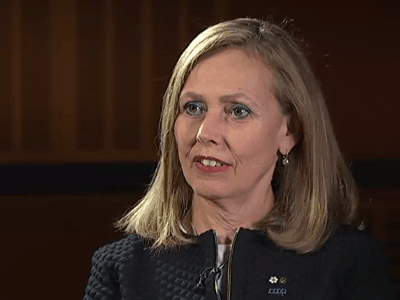
 A recent interview on Australian television by Monique Leroux, President and CEO of Desjardins Group, provides some insight into the importance of pursuing a sustainable growth strategy for Canada’s future, led by our innovation sector.
A recent interview on Australian television by Monique Leroux, President and CEO of Desjardins Group, provides some insight into the importance of pursuing a sustainable growth strategy for Canada’s future, led by our innovation sector.
With over 7 million members and clients and $230 billion in assets, Desjardins Group has “weathered the storm” a little more convincingly than its private sector contemporaries, and its strategies for growth are probably worth listening to, even if they seem to run counter to the venture capital ethos.
Leroux was in Australia chairing a meeting of the International Co-operative Alliance, where she spelled out Desjardins’ strategy for growth as Canada attempts to transition from the dominance of the resource sector to an atmosphere that privileges innovation.
As navel-gazing and insecure as we can be in Canada, particularly when outside observers matter-of-factly point out that the Canadian economy is largely chained to our petro-dollar, it can be refreshing to hear a case for long-term Canadian diversification explained to a foreign audience.
On Australian program The Business, journalist Elysse Morgan begins her interview with a palpably incredulous smirk, asking, “You’ve outlined an aggressive growth strategy for Desjardins, but the Canadian economy, similar to the Australian economy, isn’t exactly booming at the moment. How do you grow a financial institution in this environment?”
“Canada is a natural resource economy, that’s for sure,” replies Leroux. “But there’s a lot of diversity in the country. So the situation, for example, in Quebec or in B.C. is slightly different than the situation in Alberta.”
Such provincial distinctions may seem slightly meaningless to Australians, or to most non-Canadians, who think of Canada mainly as America’s hat, or perhaps as a sparsely populated land of ice and snow with a bit of oil in the ground, if they think of us at all.
To be fair, it would be the same for Canadians being told that Perth is “completely different” than Sydney or Melbourne. Maybe true, but we’d have to open an atlas to be sure.
“During the financial crisis, many financial institutions had to be saved by governments. That was not the case for co-op organizations.” – Desjardins President Monique Leroux
Pointing out that there are now conversations happening on the subjects of innovation and technology companies, and the need for collaboration between Canadian municipal, provincial and federal governments, Leroux believes that investment in those forward looking sectors is where Desjardins will be concentrating its investment strategy.
“There are a lot of opportunities, even for a natural resources based economy, to invest in those areas, and I think that’s what we will be doing in Canada,” says Leroux. “So maybe it could apply also for Australia!”
Unlike PM Justin Trudeau, when he stands on the world stage talking about the “resourcefulness” of Canadians as an attempt to change the subject from our bottomed-out resource sector to a more optimistic note, Leroux has some very pragmatic reasons to believe that Canada’s future lies in innovation.
But there are other reasons to take Leroux’s worldview seriously when she talks about investing in innovation.
As Morgan points out during the interview, Leroux shepherded Desjardins through the global financial crisis in 2008, which saw the domino-like collapse of America’s banking sector, which was saved only by massive government intervention.
“During the financial crisis, many financial institutions had to be saved by governments,” says Leroux. “That was not the case for co-op organizations. Most of them, including large co-op groups in Europe, and Desjardins in Canada, we were able to grow through the crisis in a way that was there to support people. We didn’t have to take decisions to withdraw from different markets. So the business model is very resilient.”
“For young people who would like to start their own businesses, I think that the co-op model is quite interesting.” – Monique Leroux
Established in 1895, the International Co-operative Alliance is headquartered in Geneva, Switzerland, with four regional offices in Africa, Americas, Asia-Pacific and Europe, plus sectoral organizations for agriculture, consumer-retail, banking, fisheries, health, housing, insurance and workers co-operatives.
“It’s not a well-known business model. Maybe sometimes a little bit quiet, not too much headlines, but at the end of the day creating a lot of jobs,” Leroux tells Morgan.
Indeed, the co-operative model represents roughly one billion people worldwide, supporting over three million co-op businesses and about 250 million associated jobs, generating about $3 trillion in revenues, or as Leroux points out, more than the size of the Canadian and Australian economies, and in the case of Desjardins growing at a rate between 5% and 10% annually.
The secret ingredient to this resiliency and steady growth may seem a little counter-intuitive to venture capitalists, Canadian or otherwise.
“Our objective is not to maximize return on equity,” says Leroux. “That’s not what we want to do. We want to be there for the long term. So we want to make sure that we have a very solid capital base and steady growth, without very much volatility in our earnings. So it’s a model that I think is very important for the economy and for society in general.”
It’s clear in hindsight, too, that 2008 signaled a shift in people’s attitudes towards the economy, and towards their very lives, with the beginnings of what we now recognize as start-up culture, which was a very real response on the part of twenty- and thirtysomethings to the permanent disappearance of the idea of having a job for life or that any institution was “too big to fail”.
“For young people who would like to start their own businesses, I think that the co-op model is quite interesting,” says Leroux. “We have, in the context of the world right now, a lot of pressure in terms of inequalities. I think the co-op model brings people and business together, and that’s quite important.”
Watch the full interview here.
Leave a Reply
You must be logged in to post a comment.
RELATED POSTS

Toronto-based identity and authentication solutions provider SecureKey Technologies Inc. has raised C$27 million in growth capital, a strategic investment round...



 Share
Share Tweet
Tweet Share
Share




Comment